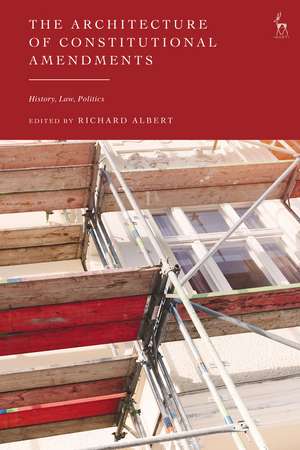The Architecture of Constitutional Amendments: History, Law, Politics
Editat de Richard Alberten Limba Engleză Hardback – 17 mai 2023
Preț: 540.80 lei
Preț vechi: 774.29 lei
-30% Nou
Puncte Express: 811
Preț estimativ în valută:
103.50€ • 107.65$ • 85.44£
103.50€ • 107.65$ • 85.44£
Carte tipărită la comandă
Livrare economică 15-29 aprilie
Livrare express 08-14 martie pentru 126.27 lei
Preluare comenzi: 021 569.72.76
Specificații
ISBN-13: 9781509959082
ISBN-10: 1509959084
Pagini: 280
Dimensiuni: 156 x 234 x 24 mm
Greutate: 0.57 kg
Editura: Bloomsbury Publishing
Colecția Hart Publishing
Locul publicării:London, United Kingdom
ISBN-10: 1509959084
Pagini: 280
Dimensiuni: 156 x 234 x 24 mm
Greutate: 0.57 kg
Editura: Bloomsbury Publishing
Colecția Hart Publishing
Locul publicării:London, United Kingdom
Caracteristici
Examines the 3 major models of amendment codification: the appendative, the integrative, and the invisible models
Notă biografică
Richard Albert is Director of Constitutional Studies, William Stamps Farish Professor in Law, and Professor of Government at the University of Texas at Austin, USA.
Cuprins
List of ContributorsIntroduction: How Should Constitutions Codify Amendments?, Richard Albert (University of Texas at Austin, USA)1. The Traces of Formalism: The Spanish Invisible Model of Constitutional Codification, Patricia García Majado (University of Oviedo, Spain)2. The Presentist Portuguese Constitution, Catarina Santos Botelho (Universidade Católica Portuguesa, Portugal)3. Caught Between: On the Distinctive Character of Mexico's Model of Amendment Codification, Jaime Olaiz-González (Universidad Panamericana Law School, Mexico)4. The Incorporation of Amendments in Paraguayan Constitutionalism, Diego Moreno (Catholic University of Asunción, Paraguay)5. The Codification of Constitutional Amendments in Brazil: Beyond the Appendative and Integrative Models, Bruno Santos Cunha (The Ohio State University Moritz College of Law, USA)6. The Form of Constitutional Amendments in Japan, Masahiko Kinoshita (Kobe University, Japan)7. When Temporary Becomes Indefinite: Legitimacy, Path Dependency and Taiwan's Hybrid Approach to Codifying Constitutional Amendment, Hui-Wen Chen (University of Warwick, UK)8. Amendment Politics in South Korea: Invisible Constitutional Replacements in 1960 and 1962, Jeong-In Yun (Korea University, Republic of Korea)9. Crafting Amendments During Political Upheaval: Amendment Models and Constitutional Stability in Afghanistan, Shamshad Pasarlay (Max Planck Foundation for International Peace and the Rule of Law, Germany)10. Codifying Secularism in the Bangladesh Constitution, Sharowat Shamin (SOAS University of London, UK)11. The Integrative Model of Constitutional Amendment in Indonesia as a Constitutional Communication, Rosa Ristawati (Airlangga University, Indonesia), Radian Salman (Airlangga University, Indonesia) 12. The Amalgamation of Amendment Codification Models in Ethiopia: A Move towards Unwritten Constitution, Zelalem Eshetu Degifie (Wollo University, Ethiopia)13. Amendment Codification in Switzerland: Codifying an Evolving Culture of Constitutional Pragmatism, Caspar Pfrunder (University of St. Gallen, Switzerland)14. Between Accessibility and Oblivion: Strengths and Weaknesses of the "Invisible" Dutch Constitutional Amendment Model, Gert-Jan Leenknegt (Tilburg University, the Netherlands), Reijer Passchier (The Open University, UK, and Leidan University, the Netherlands)15. Codification of Constitutional Amendments as a Symbol for Transitions: A Case Study from Hungary, Eszter Bodnár (ELTE Eötvös Loránd University, Hungary, and Lecturer at the University of Victoria, Canada)16. One Constitution, Two Models of Codification: Between Trust and Distrust of Constitutional Interpretations in Albania, Arta Vorpsi (Tirana University, Albania)17. Georgia's Model of Constitutional Amendment Codification, Malkhaz Nakashidze (Batumi Shota Rustaveli State University, Georgia)
